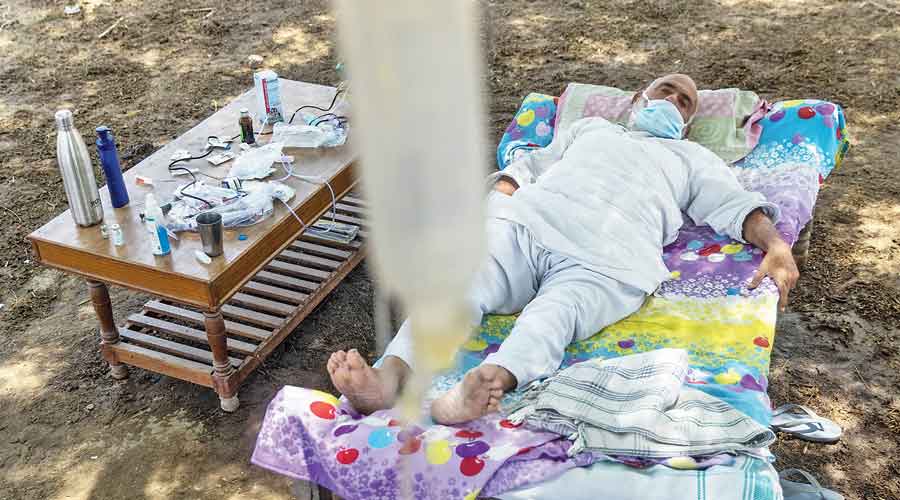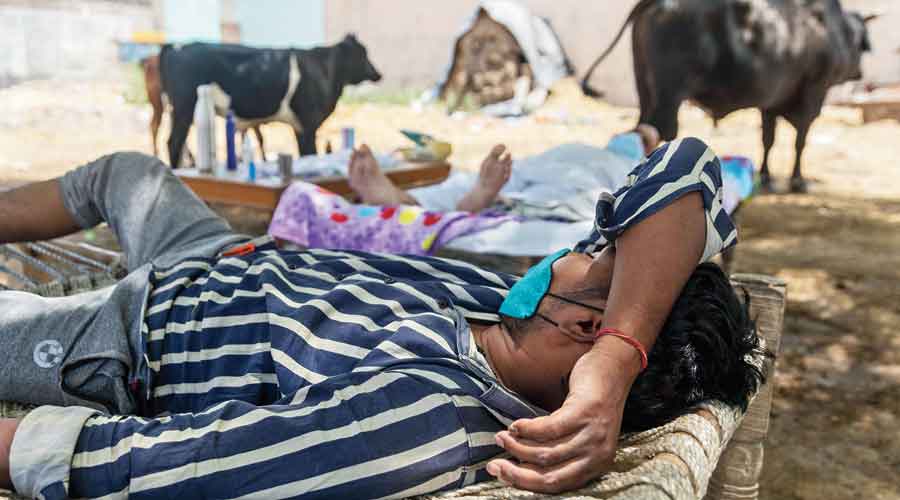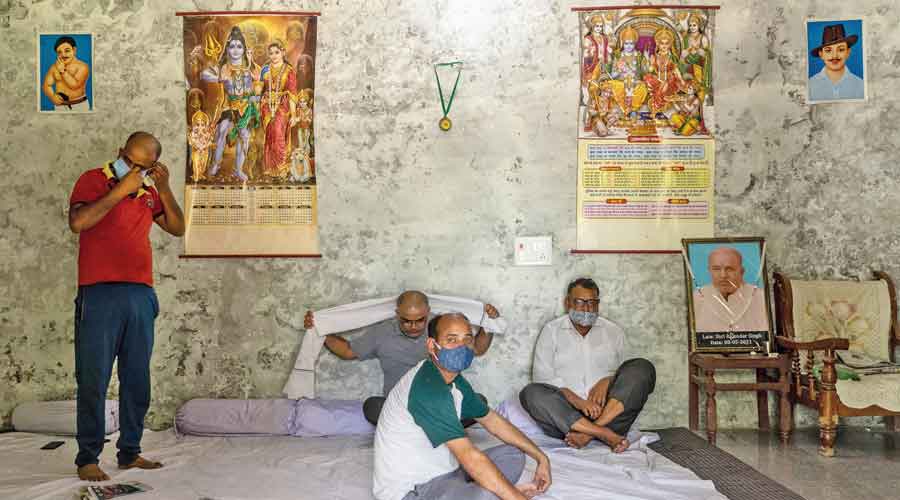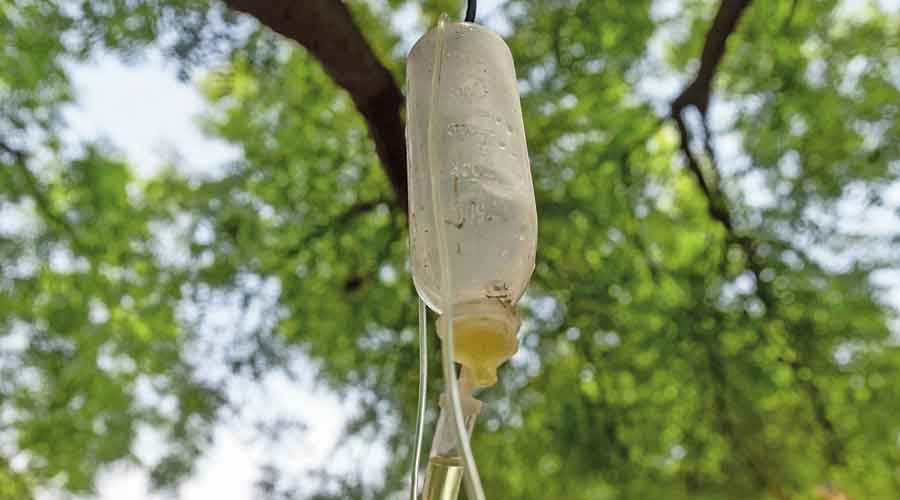Mewla Gopalgarh village, around 100km southeast of Delhi, caused widespread consternation this week when news photos showed its residents being treated in a makeshift, open-air clinic run by unqualified practitioners.
Now the Yogi Adityanath government has worked out its own remedy for such embarrassments — FIR therapy.
A local politician who had alerted the media about the Covid situation in the Uttar Pradesh village has been booked for “act likely to spread infection” — a month after the Supreme Court cautioned state governments against “clampdown of information”.
Yogesh Talan, Congress member and husband of the former sarpanch of Mewla Gopalgarh, located in Gautam Buddha Nagar or Noida district, is now at an undisclosed location.

Covid patient Harveer Singh, 65, receives treatment at a makeshift open-air clinic in Mewla Gopalgarh village last week.
Disturbed by the death of a friend and the sight of several neighbours gasping for breath, Talan had called up journalists whose numbers he possessed.
On May 15, the Noida edition of an English newspaper published a report about a motley bunch of quacks treating patients in the village under a neem tree with remedies that had little effect on what seemed moderate symptoms of Covid. Other local dailies and TV channels too picked up the story.
Talan’s efforts paid off. On May 17, a state health department team came to test people in the village, and an ambulance was sent for one patient. The same day, an FIR was filed against Talan under sections 188 (disobedience of a public servant’s order), 269 and 270 (negligent or malignant act likely to spread infection of disease dangerous to life) and 505(1) (incitement) of the Indian Penal Code and the Epidemic Diseases Act, 1897.
Noida officials conducted several raids on quacks this week.
News agency PTI has reported that “112 people were tested in the village on May 13 while 154 (were) tested on May 17 with none resulting in a positive”.
Media reports have suggested efforts by many state governments to downplay the Covid situation, for instance, by grossly underreporting the deaths. Uttar Pradesh chief minister Adityanath, angered by reports of an oxygen and medicine shortage in his state, had last month issued an order to book “rumour mongers”.
Reports say this led to FIRs against relatives of some Covid patients who had sought help on social media, and against some hospital managements that had put up notices declaring an oxygen shortage.

A villager with breathing difficulties rest in a cot as he receives treatment at the makeshift open-air clinic last week
Talan told The Telegraph over the phone: “The cops came on Wednesday but I was not at home. They did not give anything in writing. I decided to seek legal help before I returned home. I was happy when the medical team came on May 17, but they have not returned since.”
Noida’s chief medical officer, Deepak Ohri, and police commissioner Alok Singh did not respond to messages and calls from this newspaper.
Talan said: “No one wants to die. The nearest hospitals are in Jewar (3km away). On May 8, Rajender Singh was ill and his son took him to Jewar. The whole day they tried to admit him but could not find a bed. He died during the day. So, people now try and get whatever treatment is available.”
He added: “I’m being punished because now the world knows that the health system forgot about us and there are people just taking any medicine, and managing cylinders for themselves and gasping for breath. The police will not rest until they get me, all the more because I’m with the Congress.”
Talan went on: “I don’t feel scared of the police as such because the situation is so bad that one should rather be scared of the virus. But the villagers are scared. They are confused: (they fear) that if they speak out they will get stuck in cases, but if they don’t they may die....
“This illness (in the village) started after the panchayat polls. I know five homes where people are seriously ill, including my immediate neighbour. Three people have told me they are Covid-positive. Many don’t know how to check the test results online. Now that I’m outside the village, I can’t help them, either.”
On May 19, a primary teachers’ association had listed 1,621 teachers and other school staff who it said had died of Covid after participating in the panchayat poll process, from training sessions that began early in April to the end of counting on May 5.
Allahabad High Court has censured the state election commission for not carrying out mandatory RT-PCR tests on polling staff and candidates.
A health activist said the Ayushman Bharat scheme had in 2018 promised the upgrade of 1.5 lakh health centres into “health and wellness centres” with facilities that would be expected to avert ordeals like Mewla Gopalgarh’s.
These centres are to cover populations of 3,000 to 5,000. The 2011 census counted 2,539 residents in Mewla Gopalgarh, a figure that Talan estimates has grown to 4,000 now, but there is no health centre in the village.
Under the government’s plan, 70,000 health and wellness centres should have come up by March 31 this year. In a reply to Parliament last year, the Centre had said that almost 30,000 had been set up by February 2020. No official figures on the subject have been readily available since then.
“Where are these centres?” asked Harjit Singh Bhatti, president of the Progressive Medicos and Scientists Forum, a health rights and voluntary service NGO.
“People (villagers) are scared to go out (too far to seek healthcare) because the police harass the poor during lockdowns. They also have the misconception that big hospitals treat only big shots. They are more likely to access a functioning public health centre, or Covid care centre nearby,” Bhatti added.
“People go to quacks when they don’t have this access and they can’t afford private healthcare. They often aggravate their condition and eventually end up in an AIIMS or Safdarjung Hospital when they are about to die.”
The FIRs are yet to halt the rampaging virus, with Uttar Pradesh recording 347 Covid deaths on Thursday and the banks of its rivers still strewn with half-buried corpses.


